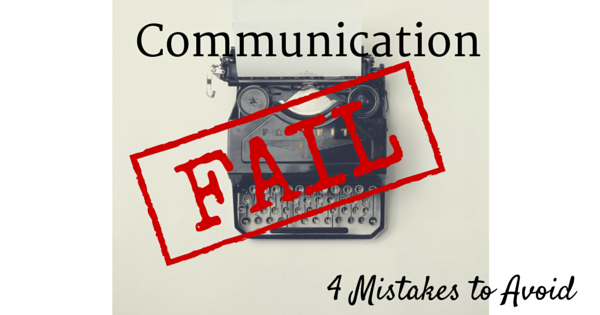Get more good stuff.
Communication is important.
According to the Project Management Institute, poor communication is to blame for more than half of every failed project.
Organizations that have highly-effective communications deliver more successful projects and are 1.7 times more likely to outperform their peers financially.
Good communicators are five times more likely to be high performers (they deliver 80% or more of projects on-time, within budget, and per goals) than minimally-effective communicators.
Communication is important essential.
Top 4 Communication Fails
 As we saw from the data above, delivering projects successfully requires good communication. Instead of describing what it takes to be a good communicator, I want to highlight what not to do.
As we saw from the data above, delivering projects successfully requires good communication. Instead of describing what it takes to be a good communicator, I want to highlight what not to do.
Avoid these top communication fails and you will be on the path to success:
- Avoid Treating Everyone the Same
- Picture the person who while in a meeting with senior executives shares how they plan to modify line 38 of a function’s code so variables can be better analyzed by the software program. Don’t be this person.
- When managing a project, you will communicate with all sorts of audiences – technical, non-technical, those who want a quick update, and those that want a deep dive. Cater communications to different audiences so everyone can understand.
- Avoid Silence
- Silence is like a bad magic trick; it can either distort the reality of a project or completely make a project disappear [poof!]. When communications are non-existent or infrequent, people tend to fill in the blanks themselves and make guesses -or- they forget about the project all-together.
- Your stakeholders want to support you and the success of the project. They assist with clearing obstacles and keeping your project a priority. Give stakeholders the information they need so they can help.
- Avoid Problems Without Plans
- If during a doctor’s appointment you are diagnosed with an illness, you expect to also receive a plan to get you to better health. The plan may be a solution (“take this medicine”) or it may involve additional tests or specialists to gather more information.
- Every project has its challenges and will inevitably face problems. When you find a problem, determine what the initial plan is (again, this may not be a solution) and communicate both promptly. Problems and plans to address them should always be communicated together.
- Avoid Inconsistency
- Imagine the Sunday paper was delivered on Tuesday or the headlines and top stories were buried somewhere between the sports and comics sections. Readers would lose trust in the paper service and get frustrated trying to find the information that they really care about.
- Create consistent communications so people know what to expect and when to expect it. Balance the frequency of communications with the demand and your workload. Standardize the format of emails and presentations like a newspaper – give readers the opportunity to read headlines or get details. Consistent communications build trust.

